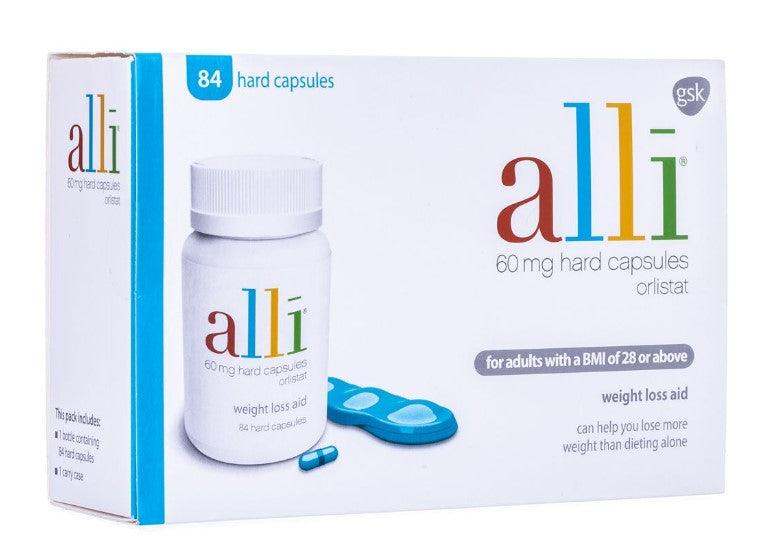Alli General Information
How effective is Alli for weight loss?
Alli's effectiveness in promoting weight loss has been scientifically proven. As an over-the-counter version of the prescription drug orlistat, it works by inhibiting fat absorption in the body. Patients using Alli are able to expect to lose an additional 1kg for every 2kg lost through dieting alone, as explained by Clinical dietitian, Dr Sarah Brewer. The estimated weight loss indicates a substantial benefit to those seeking assistance in their weight loss journey. However, effectiveness varies among individuals and is significantly influenced by adherence to a low-fat diet and regular physical activity.
Alli weight loss reviews before and after
Reviews for Alli often exhibit significant weight loss transformations. It is common for users to report noticeable weight loss results within just a few weeks. 60% of Alli users reported achieving their target weight loss within six months of regular use, according to a 2022 survey. While these reviews reflect the potential of Alli, individual results vary depending on factors such as diet, exercise and initial weight.
Alli Results After Two Weeks
Alli often starts to show results within the first two weeks. These early results typically manifest as a reduction in weight, often accompanied by a noticeable decrease in waist circumference. The early response is motivating for users, encouraging adherence to healthy habits and the continued use of Alli, as explained by dietitian Dr Carrie Ruxton. Remember that everyone's body responds differently to weight loss supplements, and it's important to have realistic expectations and patience throughout the process.
Alli Dosage & Usage
How much Alli to take (dosage)?
The standard dosage of Alli is one 60mg capsule three times a day with meals containing fat. It is important to take Alli with meals to maximise its efficacy, as emphasised by Nutritionist Dr. Marilyn Glenville, Alli works by reducing fat absorption in the gut, therefore taking it with meals ensures it works effectively on the dietary fat consumed. The maximum dose of Alli must not exceed three capsules a day unless advised otherwise by a healthcare professional.
How much weight will I lose in a week on Alli?
On average, individuals expect to lose 1-2 pounds per week when combined with a low-fat diet and exercise. However, the weight loss associated with Alli varies widely among individuals. The range reflects the average weekly weight loss in most clinical trials with Alli, as explained by Dr Sarah Brewer. It is important to note that weight loss might not be consistent from week to week and individual results depend on factors such as dietary intake and physical activity levels.
When should you not take Alli?
Alli is not suitable for everyone, it is not recommended for those who are pregnant, breastfeeding, or have a BMI below 28. Furthermore, people with malabsorption issues or those on certain medications, like cyclosporine or levothyroxine, must avoid Alli due to potential drug interactions and side effects, as explained by Dr Megan Rossi. It's crucial to consult with a healthcare professional before starting any new medication, including Alli, to ensure it is safe and suitable for each individual's specific health circumstances.
How long does Alli last?
The effects of Alli are expected to last for up to several hours following ingestion. Alli works locally in the stomach and small intestine for about two to four hours after consumption, as highlighted by Dr Carrie Ruxton. However, its impact on weight loss is longer-lasting, particularly when paired with a balanced diet and regular exercise.
How long does Alli take to work?
The onset of Alli's effects is typically within 24 to 48 hours of the first dose. However, weight loss usually takes longer to become noticeable. Initial weight loss is observed within two weeks, but significant results usually require two to three months, as advised by Dr Sarah Brewer. It's important to maintain a balanced diet and regular exercise regimen for Alli to work effectively.
How long do I need to take Alli for?
Alli is typically taken for at least 1 to 3 months and up to 6 months to a year, as recommended by a doctor. The duration of Alli usage varies among individuals and depends on the weight loss goal. If weight loss is not achieved after 12 weeks of Alli use, it is recommended to discontinue use and consult a healthcare professional. It's essential to remember that Alli is designed to complement a low-fat diet and regular exercise, not replace them. Long-term success in weight management requires consistent adherence to a healthy lifestyle.
Alli Availability & Pricing
Is Alli available in the UK?
Yes, Alli is available in the UK. It was approved for over-the-counter sale by the Medicines and Healthcare Products Regulatory Agency (MHRA) in 2009. Today, it remains a popular choice for individuals seeking weight management assistance. Alli has proven to be an accessible and effective weight loss aid for many in the UK, as explained by pharmacist Kevin Noble.
Cheapest place to buy Alli
The cost of Alli varies significantly depending on where it's purchased. Supermarkets, pharmacies, and online retailers all offer varying prices. It's recommended to compare prices across several trusted platforms to find the most affordable option. While price is important, consider the credibility and customer service of the seller, as advised by Dr Kevin Noble.
Can I buy Alli online?
Yes, Alli is available for purchase online from various reputable pharmacies and retailers. It's essential to ensure that the chosen retailer is reputable to avoid counterfeit products. Online purchases, while convenient, require careful scrutiny to ensure the safety and quality of products, as highlighted by Dr Marilyn Glenville.
Can I get Alli over the counter?
Yes, Alli is available over the counter without a prescription. It was the first weight loss drug to receive approval for over-the-counter sale by the MHRA. The over-the-counter availability has made Alli a popular option for many seeking assistance with weight management, as explained by As Dr Sarah Brewer.
Does Holland and Barrett sell Alli?
No, while Holland and Barrett stock a wide range of health and wellness products, they do not currently stock Alli. It's always wise to check with individual retailers for their latest stock and product availability, as explained by Dr Megan Rossi.
Alli Side Effects & Considerations
What to do if you get Alli side effects
If Alli side effects occur, it's important to assess their severity and if concerned contact a doctor. Mild side effects such as minor stomach discomfort or changes in bowel habits are manageable. However, if these side effects persist or become severe, Dr Carrie Ruxton advises discontinuing use and consulting a healthcare professional immediately.
Alternatives & Related Treatments
Alli Vs Xenical
Alli and Xenical contain the same active ingredient, orlistat, but in different doses. Alli contains 60mg of orlistat and is available over the counter, while Xenical contains 120mg and requires a prescription. Both are considered effective for weight loss, but a healthcare professional is able to advise on the most suitable option, as clarified by Dr Justine Hextall.
Alli Vs Orlistat
Alli is the brand name of the generic drug Orlistat. Both Alli and Orlistat work in the same way and have similar effectiveness, as explained by Dr Marilyn Glenville, the choice between them often comes down to price and availability.
Alli Vs Saxenda
Alli and Saxenda are both weight loss aids, but they work differently. While Alli blocks fat absorption in the gut, Saxenda is a prescription injection that regulates appetite. Saxenda is often used when diet and exercise have failed and carries a higher risk of side effects, as noted by Dr Sarah Brewer. A healthcare professional provides guidance on the best treatment option based on individual health status and weight loss goals.
Alli FAQ's
What are Alli horror stories?
'Alli horror stories' typically refer to the experiences of users who've had significant side effects or didn't achieve the desired weight loss. Some people report severe gastrointestinal symptoms, while others might not have lost weight despite adhering to the recommended low-fat diet and exercise. Like all medications, Alli is not without potential side effects. The side effect might be mitigated by following the recommended low-fat diet.
Can I take 2 Alli instead of 1 xenical?
No, while Alli and Xenical both contain the active ingredient orlistat, they have different doses. Xenical contains 120mg of orlistat, while Alli contains 60mg. Although taking two Alli tablets potentially provides a similar dose of orlistat as one Xenical tablet, it is not recommended. It's important to only take the recommended dose of any medication, including Alli, as explained by Dr Sarah Brewer. Always follow the dosage instructions given by the manufacturer or healthcare provider.
What medication stops fat absorption?
Alli, known by its generic name orlistat, is a medication that stops fat absorption. It works by inhibiting the action of lipases, enzymes in the digestive tract that break down dietary fats into smaller molecules that are absorbed by the body. By inhibiting lipase action, Alli reduces the amount of dietary fat that the body absorbs, thereby reducing calorie intake and promoting weight loss. It's crucial to note that Alli must be used in conjunction with a balanced, reduced-fat diet to manage potential gastrointestinal side effects and support overall health.



















